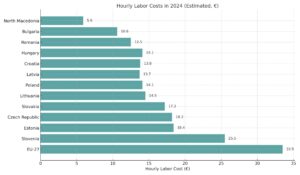GENERAL OVERVIEW
North Macedonia prides itself on its educated, highly-qualified and ethical workforce that is available to foreign investors. Educational standards at technical higher educational institutions in North Macedonia resemble those of the Western countries. Workers are welcoming of continuing education and life-long learning, completing customized vocational training. The Government is willing to help investors in the process of labor force training by participating in such programs.
EDUCATION GEARED FOR BUSINESS
The Macedonian educational system makes mandatory elementary and high school education as well as English language education starting in the first grade of elementary school. In addition to standard high schools, many vocational high schools in each city enable students to learn various trades. There are seven public and numerous private internationally recognized universities and colleges.
Every year approximately 80% of high school graduates are enrolled in universities and there was a 35% increase in the total number of undergraduate degrees in the past several years. With 45% of the population under 30 years of age, the country offers a young, educated, and skilled workforce.
SALARIES
The average gross monthly salary in January 2025 is €1046. This amount includes the net salary, personal income tax, and social contributions for pension and disability insurance, health insurance, and employment insurance. The minimum salary for each professional branch is defined by Collective agreements.
LABOR COSTS

SOCIAL CONTRIBUTIONS
The Government of the Republic of North Macedonia in the past few years significantly reduced social security contributions. Further reductions are planned and their implementation depends on the general economic conditions in the country.

